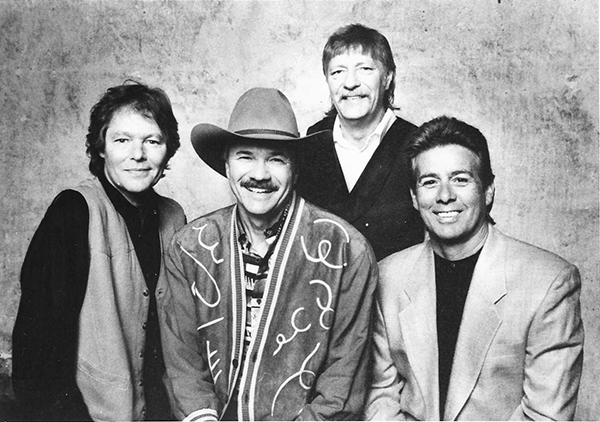Gary James' Interview With Bread's
David Gates

As lead singer for the early seventies group, Bread, David Gates touched many hearts with his songs of love. There's hardly a day that goes by that somewhere, some radio station doesn't play "Baby I'm A Want You", "Make It With You", or the "Goodbye Girl". Bread may not be together these days, but David Gates is still active. He's just released a new album titled,"Take Me Now", on Arista Records.
We chatted with David about his celebrated musical career.
Q - One thing about your songs, you tell a story and get right to the point. Does that type of songwriting come naturally for you?
A - Yeah, it does. I've never been too much about beating around the bush.
Q - It says in your bio, you started your own company at eighteen. How did you manage to get enough money at that age to do that?
A - It didn't take much because in record distribution which I started, there was no good R&B distributor in the Oklahoma area. All it took was some phone calls to R&B labels and they sent in promotional product. I had a little office downtown, $30 a month, and just my car. That's how I started. I'd drive around and try to get things played, and in the stores I learned a lot about the business side of it when I was pretty young. What I was doing didn't take a lot of capital to start. It was pretty much out of the back seat of your car type of business.
Q - You were a studio musician once. I've noticed the same guys seem to play on everybody's albums. It must've been easier to get into session work 20 years ago.
A - I think it's easy any time. If you're a good musician and willing to work for scale, you're gonna get all the work you can handle.
Q - Who are some of the people you worked with back then?
A - I started out playing bass on the Ventures albums, and then I went on and did movie stuff... played bass on Robin and the Seven Hoods movie soundtrack. I did some stuff for Phil Spector, Glenn Yarborough, Jackie DeShannon and a whole lot of people when I first got started.
Q - How can you write a theme song for a movie like, The Goodbye Girl? How do you capture the movie's spirit?
A - You just to pick up the feel from the film and get an idea of what it is the film people want, whether they want you to exactly paraphrase what's happening or kind of something that's off to the side, but connected. Then, that gives you the direction of how specific they want you to be. These guys usually have pretty strong ideas on what they want. And then it's a matter of combining your own personal ability and taste with the way you normally write and try to accomodate their feelings.
Q - Can you ever tell when you've written a song that's a winner?
A - Nine out of ten times my gut instincts are right. "Diary" fooled me. I didn't think it was a commercial hit record. I thought it was a gorgeous, intimate, little ballad, and it never occurred to me it would be a Top 40 song, which it ended up being.
Q - Why do you think Bread's music is still being played, years later?
A - I guess it's they wear well with time. They're simple and can be listened to a number of times, and you kind of want to hear 'em again and again. That's the only thing I can think of.
Q - Why'd the group split up?
A - We'd been together five years, set goals, achieved those goals. We'd all come from pretty strong backgrounds and everybody wanted to go back to what they were doing before the group. I believe groups are temporary arrangements, anyway. They're not marriages. They're only temporary, to last anywhere from two to fifteen years, or whatever you think is appropriate. Some just hang on longer than others, either because there's nothing else they'd like to do or economics are involved or whatever reasons. It's pretty tough to get four or five people to stay together year after year and not have any change in personnel and not get fatigued with the whole routine.
Q - Did critics label Bread Soft Rock?
A - Yeah they did.
Q - Did you like that label?
A - I've long since given up on avoiding labels. There's just nothing you can do about it. It's bigger than all of us.
© Gary James. All rights reserved.

Bread






